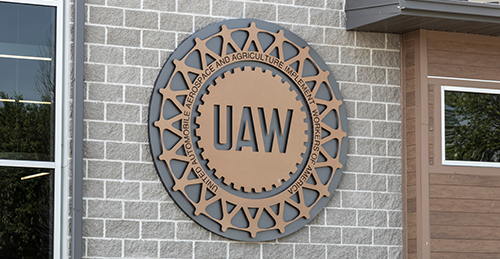 Last week, the UAW announced its support for a strike at Volkswagen’s Chattanooga, Tennessee plant. The union had previously failed to organize this facility in both 2014 and 2019. However, during the third organizing effort, Volkswagen permitted the UAW to proceed without opposition and recognized the union after a majority of employees signed pledge cards in support.
Last week, the UAW announced its support for a strike at Volkswagen’s Chattanooga, Tennessee plant. The union had previously failed to organize this facility in both 2014 and 2019. However, during the third organizing effort, Volkswagen permitted the UAW to proceed without opposition and recognized the union after a majority of employees signed pledge cards in support.
The call for a strike comes after a year of negotiations. First contracts often take the longest to settle. Unions argue this is a company tactic to dishearten and wear down workers until a decertification election be held or the union just goes away. In fact, federal legislation that would shorten the time allowed for a first contract has been considered for years without action, but it keeps being pushed mainly by the Democrats.
For its part, Volkswagen has negotiated to a “last and best” offer that includes wage increases of 20% over four years, one-time $5500 bonuses, cost of living adjustments, and a good attendance bonus of 8%.
The UAW, however, wants a 24% raise that it says brings the contract up to Big Three contracts and bigger contribution increases to health and retirement plans.
So why was this a Faustian bargain? After all, Volkswagen had beaten the UAW twice. Why did the company seemingly capitulate on the third organizing go around? A couple of forces came into play this last time around.
Volkswagen is heavily unionized in Germany, where unions even hold seats on the company’s Board of Directors. These boards, called Aufsichtsräte or Supervisory Boards, assign members to the Management Board and help shape business policy. The close collaboration between management and unions there has created a culture that is far less adversarial toward unionization than is typical in U.S. companies. This likely influenced Volkswagen’s decision to stay on the sidelines during the most recent UAW election.
Another factor may have been pressure from 33 Senate Democrats, who, during what has been called the most labor-friendly administration in U.S. history, warned non-union automakers that opposing union efforts could jeopardize government subsidies for electric vehicle development.
Cooincidentally, the Volkswagen Tennessee plant is where that company makes electric vehicles (EV). Ironically, those EV subsidies are going away due to the Trump Administration’s order and the GOP budget bill. The pro-union Democrats are out, and the pro-business, anti-union (somewhat) Republicans are in.
By choosing to remain neutral and avoid anti-union messaging during the last campaign, Volkswagen secured peace and political favor but now faces the possibility of a costly and highly visible work stoppage. The consequences of that Faustian bargain are unfolding.
Source: Wall Street Journal. The Editorial Board. Volkswagen Gets What It Paid For, 10/2/2025